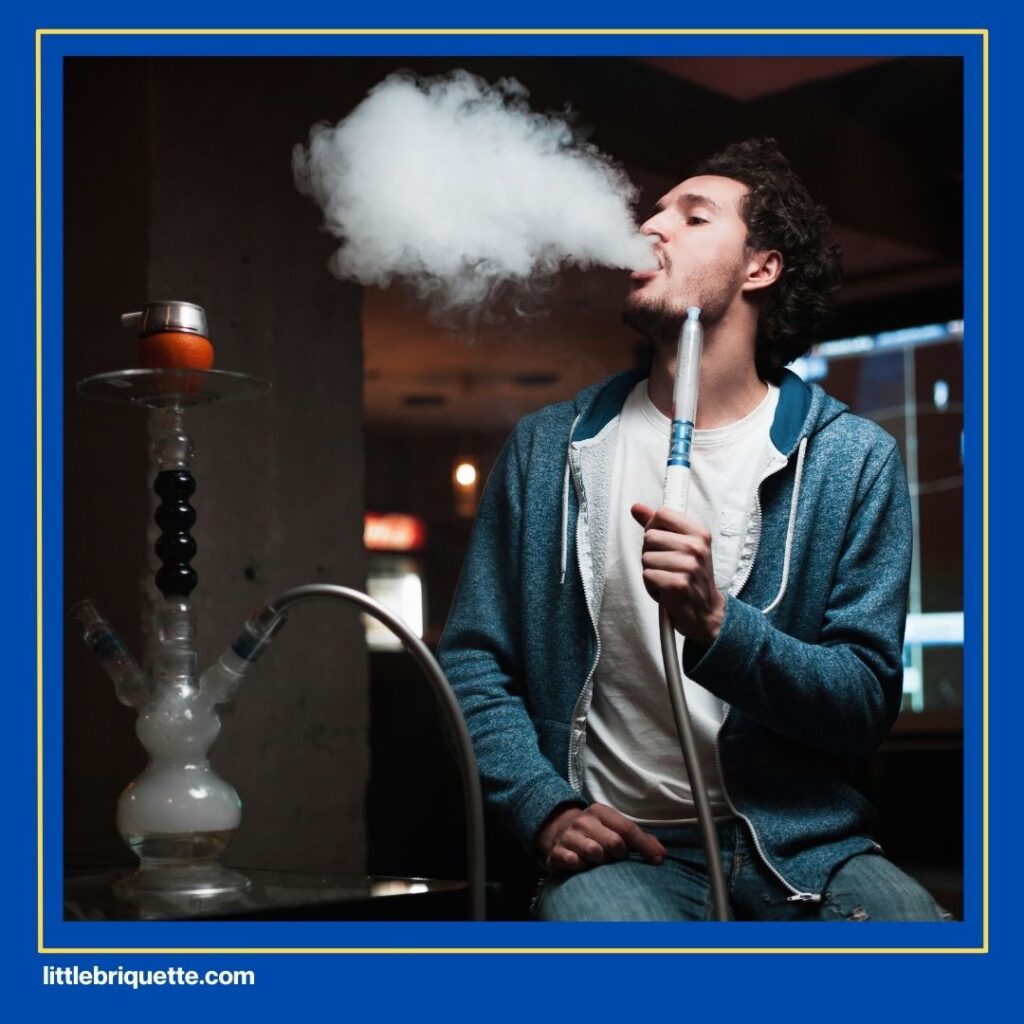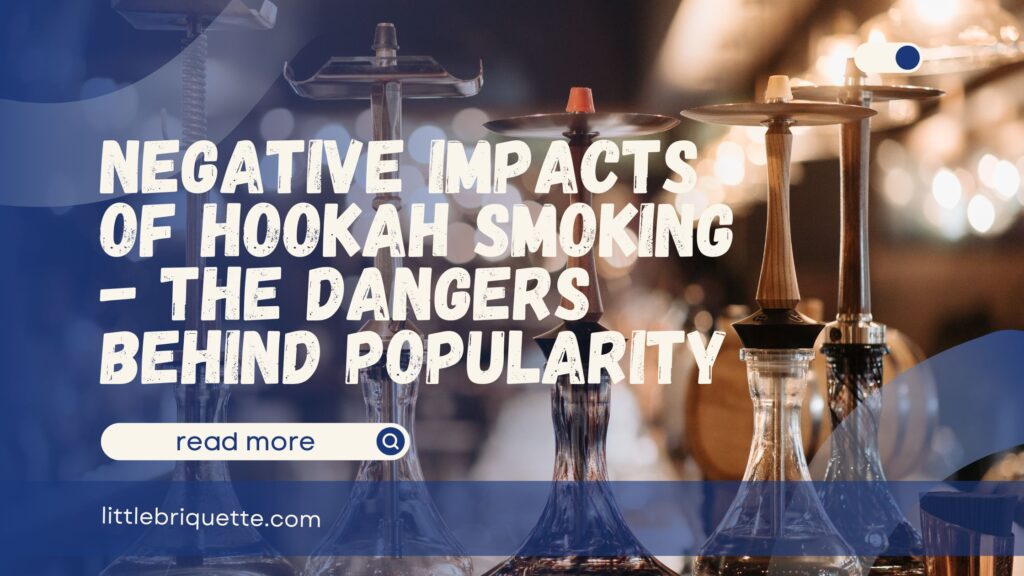Hookah has become an increasingly popular phenomenon among teenagers and young adults, often seen as a more social and “safer” choice compared to smoking regular cigarettes. In a relaxed atmosphere at a café or bar, many people are captivated by the fragrant smoke produced and the variety of experiences it offers. However, there are certainly negative impacts of hookah smoking that are often overlooked, including serious health risks and the potential for addiction. Below is a more detailed explanation of the negative impacts of hookah smoking behind its popularity.
Negative Impacts of Hookah Smoking
The negative impacts of hookah smoking need to be acknowledged by users, as it poses significant health risks. This is especially true for individuals with a history of illness, as the consequences can be quite severe. Here are some negative impacts of hookah smoking:
Lung Health

Hookah smoking can have a significant impact on lung health. While many people believe that hookah smoke is lighter than cigarette smoke, in reality, the smoke produced contains numerous harmful substances, including tar, carbon monoxide, and various other toxic chemicals. Using a hookah can irritate the respiratory tract, increasing the risk of conditions such as chronic bronchitis and chronic obstructive pulmonary disease (COPD). Research shows that hookah users can inhale a much larger volume of smoke compared to cigarette smokers, thus increasing the risk of lung damage.
Additionally, hookah use is associated with an increased risk of lung cancer. Hookah smoke contains the same carcinogens as cigarettes, and long-term exposure can trigger cellular changes that may lead to cancer. Many people mistakenly believe that smoking hookah is harmless due to its seemingly more relaxed consumption method; however, the facts indicate that long-term hookah use can contribute to the development of serious diseases. Therefore, it is important to recognize that there is no form of smoking that is truly safe, including hookah.
Cardiovascular Effects in Negative Impacts of Hookah Smoking

The negative impacts of hookah smoking are not limited to lung health; they also adversely affect the cardiovascular system. Hookah smoke contains carbon monoxide, nicotine, and other harmful substances that can impair heart and blood vessel function. When someone smokes hookah, the inhaled carbon monoxide can reduce the amount of oxygen delivered to the heart, thereby increasing the risk of heart problems, including heart attacks and strokes.
Hookah smoking can also accelerate the process of atherosclerosis, which is the buildup of plaque in the arteries, leading to their narrowing and hardening. This process is particularly dangerous as it can restrict blood flow to vital organs and heighten the risk of serious complications. Research shows that regular hookah users experience endothelial dysfunction, which is the damage to the cell layer lining the blood vessels. This damage can worsen heart health and increase the long-term risk of cardiovascular diseases. Awareness of these negative impacts of hookah smoking is crucial for those considering it or already using it.
Addiction Risks

Hookah contains nicotine, an addictive substance that can lead to serious addiction. When someone inhales hookah, nicotine quickly enters the bloodstream and affects the brain, creating feelings of euphoria that encourage individuals to smoke more frequently. Additionally, the social habits surrounding hookah smoking contribute to addiction risk. Many people smoke hookah in group settings, where peer pressure and social norms make the activity seem more appealing and accepted. As a result, hookah use can evolve into a routine habit that is hard to break, reinforcing dependence on nicotine and increasing the risk of negative health effects.
Read Also: Health Benefits of Hookah for the Body, Fact or Myth?
Social and Psychological Influences
Social and psychological influences play a significant role in the decision to smoke hookah, often driven by social norms and peer pressure. In many communities, hookah smoking is viewed as a trendy and appealing activity, prompting individuals to participate in order to be accepted by their peers. Peer pressure can create situations where someone feels they must smoke hookah to demonstrate they are “cool” or to avoid being seen as an outsider. In this context, smoking hookah becomes not just an individual choice, but also a means of building social identity and a sense of belonging among friends.
For teenagers, the psychological impact of hookah smoking can be quite significant. Many adolescents, who are in a stage of identity exploration and personal development, may use hookah as a way to express freedom and autonomy. However, this habit can also lead to problems such as increased anxiety, depression, and emotional stress if they feel trapped in a smoking cycle. Furthermore, hookah use among teenagers is often linked to long-term health issues, as they may not fully understand the consequences of this behavior. Thus, the social and psychological influences on hookah use are complex and can have a profound impact on the development and mental health of adolescents.
The Role of Coconut Charcoal for Safer Hookah Smoking
Coconut charcoal is becoming increasingly popular as a fuel for hookah smoking, as it is considered safer and more environmentally friendly compared to regular charcoal. Coconut charcoal is made from coconut shells that are burned in a specific way, resulting in high-quality charcoal with lower carbon emissions. The use of coconut charcoal produces cleaner smoke, reducing users’ exposure to harmful substances and carcinogens often found in wood-based charcoal or chemical alternatives. Additionally, coconut charcoal has a stable burning temperature, allowing users to enjoy the flavor and aroma of hookah tobacco more optimally without compromising its pure taste.
Moreover, coconut charcoal is more efficient in terms of burn time. It lasts longer and produces consistent heat, so users do not need to frequently add charcoal while smoking. This creates a more comfortable and enjoyable smoking experience. Although using coconut charcoal can reduce some health risks associated with hookah smoking, it is important to remember that smoking in any form still carries its own risks. Therefore, while coconut charcoal offers a better alternative, awareness of the potential dangers should remain a primary concern for users.
Read Also: Revealing the Tempting Flavor and Aroma of Hookah Smoke
Centers for High-Quality Coconut Charcoal Production
To minimize health risks associated with hookah smoking, you can opt for high-quality coconut charcoal. Quality charcoal will enhance your smoking experience and reduce health impacts. You can obtain it easily by purchasing from Little Briquette. Contact this number to get high-quality coconut charcoal in bulk.

